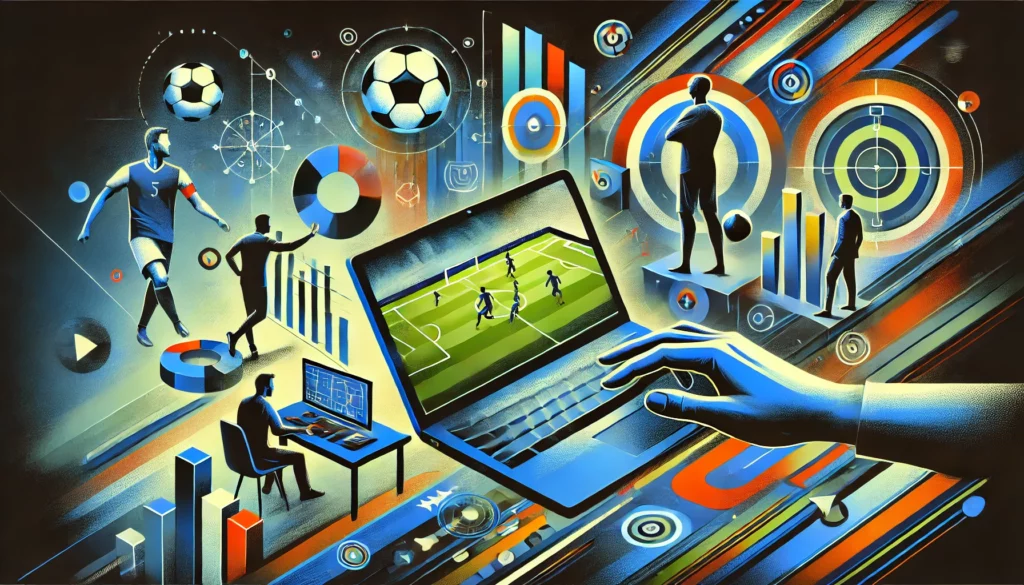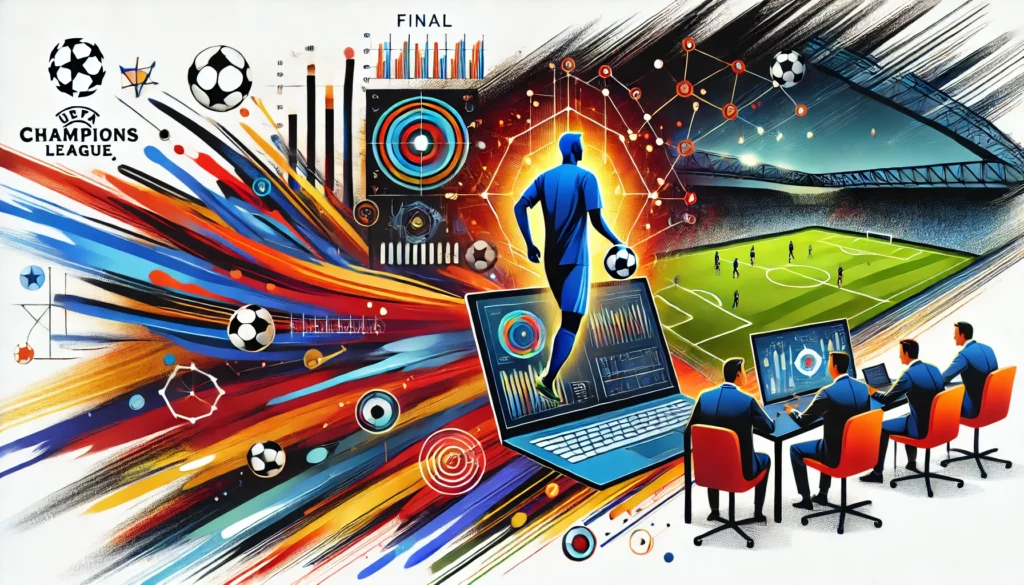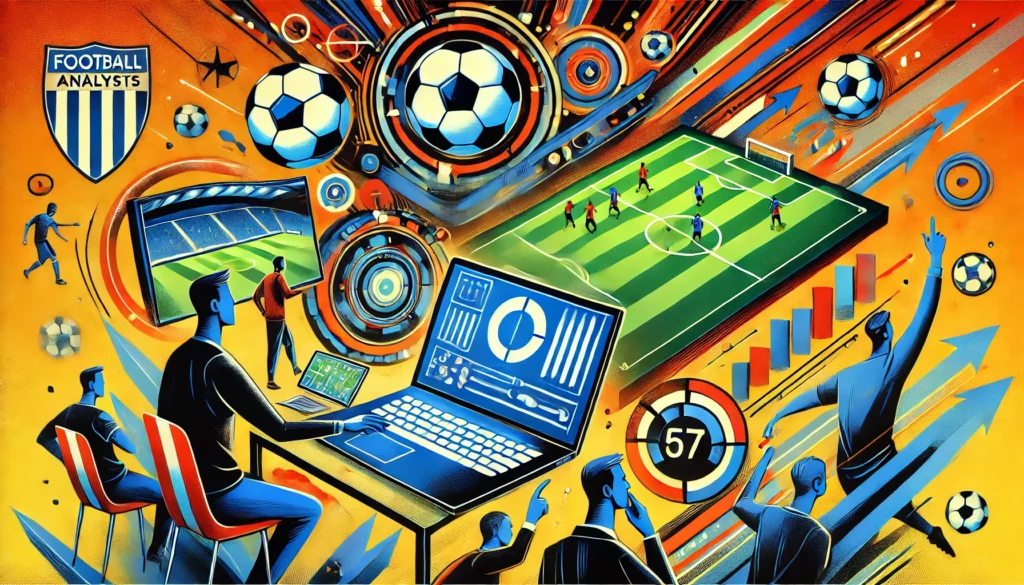
The role of the video analyst in football has developed rapidly over the last few decades. From an analysis tool for coaches to a key role in modern football clubs, both professional and youth, video analysis has become an indispensable part of the game. In this blog, you will learn step-by-step how to become a video analyst, what skills and qualifications you need and what special routes there are in Austria to gain a foothold in this profession.

What does a video analyst actually do in football?
A video analyst is a highly specialised employee of a football club or association whose main task is to analyse matches and training sessions in order to improve the team's performance and support the coach in tactical preparation.
Match analysis: After each match, all the footage is analysed by the video analyst. This involves looking at tactical patterns and the performance of individual players, as well as evaluating specific match situations such as set-pieces, pressing behaviour and counter-attacks.
Opponent analysis: An important part of the work is the detailed analysis of opposing teams. The video analyst examines the style of play, typical attacking patterns, defensive weaknesses and key players in order to provide the coaching team with a precise overview.
Training evaluation: Video analysts also film training sessions to evaluate their effectiveness. By analysing the training footage, suggestions for improvement can be made and specific weaknesses of the players can be identified.
Reporting and presentation: The collected data and video clips must be prepared and be easily presentable, often for the coaching team and the players themselves. Video clips with tactical comments, PowerPoint presentations or reports with visualisations are used here.
Live analysis: For many professional and amateur teams, the video analyst sits directly in the stands or near the coaching bench during the match and provides the coaching team with real-time data. This enables tactical adjustments to be made during the game.
Footballing understanding: A solid understanding of tactics and strategy is the foundation for any video analyst. Without this knowledge, it is almost impossible to recognise the correct meaning behind the game situations captured on video.
Tactical knowledge: You need to know how different formations work, the principles of play behind them and how different tactical aspects such as pressing, switching play or possession play.
Game analysis perspective: It is important not only to observe the game, but also to understand the deeper tactical motivations behind the decisions of the players or the coach. Understanding ‘invisible’ aspects such as spatial awareness, running routes and defensive strategies is crucial.
Technical knowledge: A video analyst needs to be familiar with a variety of software tools and technologies in order to work efficiently.The following technologies and programmes are usually essential:
Data analysis and statistics: Data analysis is playing an increasingly important role in modern football analysis. In addition to pure video processing, video analysts must be able to interpret data and prepare it in a way that is understandable for coaches and players.
Statistical tools: It is an advantage if you can work with Excel or Google Sheets and carry out basic statistical analyses; advanced knowledge of programs such as Tableau or R can help you to visualise data and carry out in-depth data analyses.
Football analysis platforms: Platforms such as Opta, FBref or StatsBomb are important sources for comprehensive statistical analyses and can be combined with video analysis to gain in-depth insights.
Attention to detail: You need to be able to recognise the smallest details that often make the difference between winning and losing. An eye for tactical subtleties and player movements is essential.
Communication skills: A video analyst works closely with the coaching team. You must be able to present your analysis clearly and comprehensively. Often the analysts also work directly with the players, so clear communication is essential.

Austria offers a wide range of training opportunities to qualify as a video analyst in football.
University education: An academic education in sports science or related subjects provides a solid theoretical foundation. Many universities in Austria offer courses in sports analysis and football tactics.
One example is the University of Vienna. There is a special sports science specialisation that also includes modules in game analysis and tactics. The advantage of a university education is that not only technical skills are taught, but also theoretical knowledge of sports economics, psychology and management.
Coach licences with the ÖFB: Another option is training through the Austrian Football Association (ÖFB). Important tactical modules that are relevant for working as a video analyst are offered as part of coaching education such as the UEFA B or A licence.
These courses not only offer the necessary football-specific training, but also a good network of other coaches and analysts that can help you get started in the profession.
Specialised courses and workshops: There are also specialised training courses for video analysts in Austria.
Private courses and online programmes: Platforms such as Coursera or edX offer courses on sports analysis. These are often a good addition to practical experience and allow you to expand your knowledge in a targeted manner.
Internships: As in many areas of sport, practical experience is invaluable. Worldwide, there are numerous opportunities to complete internships within the performance analysis departments at professional or semi-professional clubs.
Networking: A strong network is crucial for success as a video analyst. Attend coach training courses, sporting events or conferences to get in touch with like-minded people. In Austria, there are regular events as part of the ÖFB coaching courses or at major tournaments that are ideal for networking.
Own projects: Many successful video analysts have made a name for themselves with their own analysis projects. This means, for example, that you record and analyse games and share the results on platforms such as YouTube or your own blog. Such projects can serve as work samples and help with job applications.

The profession of video analyst is on the rise in Austria - as in other countries. Professional clubs and national teams in particular are increasingly relying on analysis to improve their sporting performance. Here are some possible career paths:
Professional clubs: The highest level is working for a Bundesliga club or an international club. These positions usually require a lot of experience and a strong portfolio.
National team: The ÖFB also employs video analysts for its national teams. These positions offer the opportunity to work at the highest level and cover international tournaments.
Academies and youth centres: Starting at the youth level is often a good way to gain experience and qualify for higher positions.
Let's take a look at a possible career path that leads from enthusiasm for football to employment as a video analyst at an Austrian Bundesliga club.
It all starts with a passion for football. Many video analysts come from an environment in which they have either played football themselves or have a keen interest in football. This stage is about consuming as much football as possible and developing a deep understanding of tactics, player roles and strategies.
Practical football experience: Perhaps you play for an amateur club yourself or are a passionate football fan. The aim is to develop a deep understanding of the game. This includes understanding different formations, phases of play (build-up, switching, counter-attacking) and tactical systems.
First insights into tactical analysis: You can read books on football tactics such as ‘Inverting the Pyramid’ by Jonathan Wilson or follow online tactical analyses and podcasts to deepen your knowledge.
The next step is to develop the technical skills that a video analyst needs. In this phase, you will learn how to use video analysis tools and software. A good video analyst not only needs to be football savvy, but also be able to use modern technology.
Learn video editing: Learn basic software such as Adobe Premiere Pro or Final Cut to cut and edit simple video clips.
Learn more specialised analysis software: Use software such as zone14, Nacsport or InStat, which is widely used by different clubs. These programs make it possible to encode match recordings, mark scenes and create comprehensive analyses.
Acquire data analysis skills: Data interpretation plays a major role in modern video analysis. Learn basic Excel skills and work with statistics programs such as R or Python to analyse and visualise football statistics.
Example: You decide on a course in video editing or take one of the online courses for an introduction to sports code. At the same time, you analyse football matches on your own and publish them on platforms such as YouTube to gain your first practical experience.
After developing initial technical skills, the next step is formal training and gaining practical experience in football analysis.
Studying sports science: A degree programme in sports science or training theory at universities provides theoretical knowledge about sports analysis. Many degree programmes include modules on match analysis and offer you the opportunity to combine these with practical modules.
Coaching licences: As an alternative or parallel to your studies, you can obtain coaching licences from the ÖFB (Austrian Football Association), such as the UEFA B licence, which covers tactics and match analysis. These licences definitely help in order to be taken seriously as an analyst.
Internships at clubs: To gain valuable practical experience, you can look for internships at local amateur or semi-professional clubs. Here you can put into practice what you have learnt during your studies and make your first contacts in the world of football.
Example: After graduating, you start as an intern at a regional football club in the second division. There you will have the task of filming the first team's matches and preparing initial analyses for the coaching team. You will gain an insight into the life of an analyst and make your first valuable contacts.

With your degree or coaching licence and practical experience under your belt, you are ready for your first professional jobs.
Work for amateur and semi-professional clubs: Entry into professional football is often via the youth sector or semi-professional clubs. Here you can work as an analyst and develop your skills. Many analysts start their career in youth academies or at amateur clubs to gain experience.
Example: You get a part-time job as a video analyst at a club in the Austrian 2nd Bundesliga. Here you will work closely with the coaching team, analyse the opponents and prepare weekly reports. You will learn how to prepare your analyses in such a way that they are easy to understand for the coaching team and the players. At the same time, you regularly attend ÖFB training courses to expand your network.
With a few years of experience as a video analyst and a solid network, you now have the opportunity to take the next step in your career.
Promotion to the professional ranks: The path to the Austrian Bundesliga is based on experience, reputation and contacts. Many analysts become interesting through their work in the lower leagues or through recommendations for professional clubs.
Specialisation: Specialisation: Some analysts specialise further in this phase - for example in certain tactics or working with certain areas of the squad (strikers, defenders). This makes them valuable experts in the team of a Bundesliga club.
Growing responsibility:As a Bundesliga analyst, your responsibility grows. You work closely with a team of analysts and are responsible for detailed opponent analyses, real-time analyses during the match and match preparation.
Example: Due to your successful work in the 2nd division, you are contacted by a club in the Austrian Bundesliga, e.g. Austria Wien. You start there as an analyst and support the head coach in match preparation. Your work includes analysing your team's matches in detail and preparing for upcoming opponents. You will analyse video recordings and data from platforms such as zone14 and present this information to the coaching team. At the same time, you help to implement tactical changes in the live game.

However, the path shown is just one of many. Becoming a successful video analyst requires patience, dedication and a good balance between football knowledge and technical expertise. In Austria, there are many ways to enter this profession, be it through university education, specialised coaching courses or independent further education. If you can combine your passion for football with technical understanding and are willing to keep learning, you can look forward to an exciting career as a video analyst.
The key to success lies in the combination of theoretical knowledge, practical experience and a strong network. The more time you are prepared to invest in your education and training, the greater your chances of gaining a foothold in this up-and-coming industry.
For prospective coaches, however, this also means that the path to the top requires discipline, patience and a great passion for the game. Those who take on this challenge can be sure that they will receive an education that prepares them for the highest level of football.